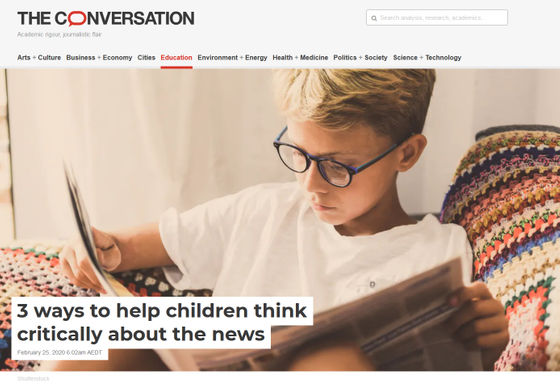What are the three points that make a child an 'adult that is not fooled by hoaxes'?

While the end of the threat of the
3 ways to help children think critically about the news
https://theconversation.com/3-ways-to-help-children-think-critically-about-the-news-131454

Tanya Notley, a humanities professor at the University of Western Sydney, and Michael Desuanni, a researcher at Digital Technology at Queensland University of Technology, have summarized how to equip children with critical thinking.
In a 2017 survey of children between the ages of 8 and 16, 73% of children received information from news programs and other sources, similar to adults, and 49% accessed news through SNS. I understood that. However, from the
◆ 1: Helps you find reliable news sources

A study by Notrey et al. Showed that children have access to a wide variety of news sources, from morning news programs to YouTube channels, but whether any news can be trusted by holding the following points is important. Can be determined.
・ Whether you clearly know who made the news or how you got the information
・ Whether it is not a subjective opinion of someone but a fact
・ If a particular organization or group's claims are communicated, are the arguments against them properly taken up?
◆ 2: Make people understand that some media abuse emotions

by alan jones
A 2017 study examining online news from 28 EU member states found that news with more stimulating and sensational headlines was more clickable. 'Naturally, it's natural for serious events to evoke emotions, but noteys point out,' said Notley, who uses emotions for their own self-interest. The following is a typical example.
・ Use sensational headings that are not based on the facts such as 'Amazing herbs that kill coronaviruses!' 'Coronaviruses spread rapidly on Sydney trains!'
-Use words that are emotional and deny humanity, such as calling asylum seekers 'people who are waiting in line' or calling such people 'big fools'
Use stunning or modified images, such as 'Photos suggesting that a celebrity is pregnant or cheating'
Also, it is effective to teach that the following intentions are hidden behind the spread of fake news.
・ Affect elections
・ Racial discrimination ・ Sex discrimination ・ Homophobia ・ Slandering certain people
Click bait to earn advertising revenue with intentionally sensational headlines
◆ 3: Have the opportunity to discuss how the news deals with different people
'The discriminators are spreading a variety of fake news in the face of the new coronavirus,' notes Notrey. As an example, there is information such as 'Chinese food is contaminated with coronavirus' and 'Coronavirus is a biological weapon made in China and the United States'.
By reading the articles below, you can find out how the hoaxes that coronaviruses are biological weapons made in China are actually being heard, and what experts say to deny them.
Scientists object to the conspiracy theory that `` the new coronavirus was artificially created ''-gigazine

As a result of the spread of such hoaxes, discrimination against Asians has become widespread in Australia, and customers are far from stores operated by Chinese operators .
From the perspective of media literacy scholars, Notrey and Desuanni commented, 'Seeing hoaxes in the digital age is a challenge for everyone. In order to equip children with critical thinking, It's important to listen to the voices, 'she said.
Related Posts:
in Note, Posted by log1l_ks







